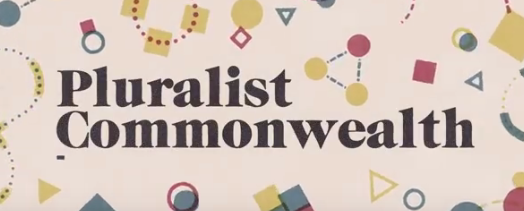Democracy Collaborative co-founder and the Next System Project co-chair Gar Alperovitz recently released a new short film (and accompanying article in Yes! Magazine) introducing his concept of the “Pluralist Commonwealth.” Per the Next System Project’s emphasis on a positive vision of the future over a critique of the status quo, the Pluralist Commonwealth re-imagines the American political economy as a decentralized network of democratic organizations oriented around egalitarianism and sustainability over profit maximization.
While certain to ring a lot of bells for academics and activists already engaged in a commons-centric work, the four-minute film does not do the trick as an explainer for the masses. Instead, its rhetoric resembles its eye-catching animations: deceptively crisp around the edges, but too abstract. It doesn't help that the narration suffers at times from a failure to translate academese into lay-speak. And while Alperovitz gestures toward contemporary examples of the institutions that will comprise the future Pluralistic Commonwealth (worker-owned cooperatives, community development financial institutions), he never answers a crucial question: how, exactly, will such grassroots initiatives drive change at the regional or national level?
The problem, as always, is scale, which the film glosses over with a quick pan-out from a local web of interconnected democratic entities to a (literally) global view. As exciting as it is to imagine employee-run businesses and participatory budgeting taking the place of for-profit corporations and political horse-trading, it is hard to envision, based on the film alone, how to translate individual success stories into a true movement. With their optimistic portraits of current developments, like the Real Food Challenge’s push to localize university provisioning, the film and article are more morale-boosters than strategic guides (see his last book for more on the latter).
That said, Alperovitz offers a tantalizing partial answer to a second burning question—why now?—in the article, "6 Ways We're Already Leading an Economic Revolution." "While progress is never strictly linear," he writes, "I believe that we are beginning to see an accelerating development of the foundations for a system that looks a lot like the Pluralist Commonwealth, and a growing recognition of how they begin to fit together." The very existence of both the Democracy Collaborative and the Next System Project, in addition to on-the-ground developments in technology-enabled sharing and the disruption of politics as usual in places from Barcelona to Bologna, appear to support Alperovitz's convictions. That his short film fails to connect all the dots between local initiatives and global transformation does not, then, mean that Alperovitz's model is itself flawed. To the contrary, it suggests that the answer is not to do less, but to do more, both to support the kinds of organizations that make up the Pluralist Commonwealth, and to educate the broader public about the benefits of a commons-based approach to social change. In the end, the short film is more an invitation to explore Alperovitz's work further than explanation, and it's an invitation worth accepting.









